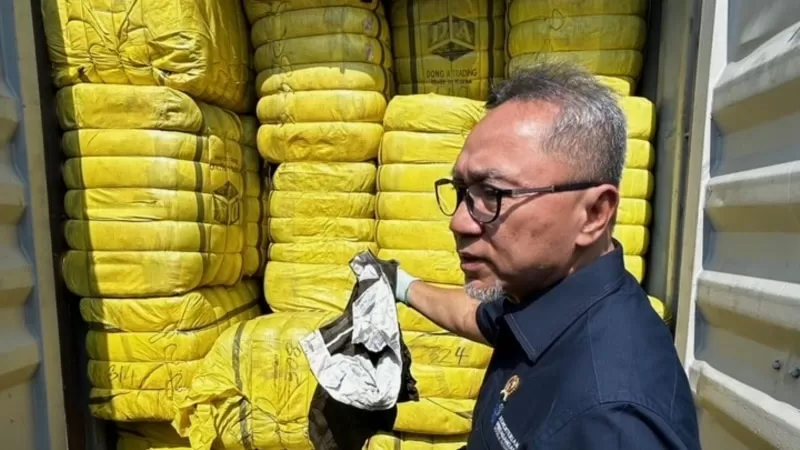Jakarta, Indonesia – The Indonesian Trade Ministry made a bold move on Monday by destroying goods worth $1.3 million in West Java. Among the items destroyed were cellphones, electric pots and pans, car washing machines, and alcoholic drinks with an ethyl alcohol or ethanol content ranging from 5% to 20%. This action was taken as part of the government’s crackdown on illegal imports, a major issue that has been plaguing the country for years.
Trade Minister Zulkifli Hasan stated that these goods did not comply with state regulations and lacked necessary documentation such as a surveyor’s report, goods registration number, or import approval. They also exceeded import quotas or failed to meet Indonesian national standards. This is the third operation conducted by the Trade Ministry, following previous operations at the Cikarang customs and excise storage area in West Java and at Jakarta’s Cengkareng Port.
The issue of illegal imports has been a long-standing problem for Indonesia, with experts citing the country’s unpreparedness for the ASEAN-China Free Trade Agreement signed 15 years ago as the root cause. Mohammad Faisal, executive director of the Center on Reform of Economics, believes that Indonesia’s domestic industries were not ready to compete with China’s competitive products in the local market. He also pointed out that Indonesia had a huge domestic market and very low trade barriers at the time, making it easy for foreign suppliers to enter the Indonesian market.
According to recent data from the Ministry of Cooperatives and Small and Medium-sized Enterprises (SMEs), approximately 50% of imported textiles and textile products are unregistered. This means that the state loses out on $399 million from unpaid taxes and excise duties. In 2022, China exported $3.95 billion of textiles to Indonesia, but only $2.04 billion of Chinese textile imports were recorded. This results in a financial loss equivalent to the potential creation of 67,000 jobs and over $762 million in gross domestic product. To put this into perspective, Indonesia’s GDP in 2023, according to the World Bank, was $1.37 trillion.
Minister Zulkifli highlighted the existence of an underground economy as one of the major obstacles in fighting illegal imports. He also pointed out that almost 30% to 40% of goods sold in Indonesian markets are involved in the underground economy, resulting in the state not receiving taxes on them. This has led to Indonesia’s tax ratio being lower than other developed Asian nations such as South Korea, Japan, and China.
To combat this issue, Zulkifli announced a plan in late June to impose stiff tariffs of up to 200% on some products. While the initial plan was to impose import duties on Chinese goods, the minister clarified that the duties would apply to all countries. This move is still under review, but it shows the government’s determination to tackle the issue of illegal imports.
The Retail and Tenant Association of Indonesia has also been actively involved in detecting shops suspected of selling illegally imported goods online across North Sumatra to East Java. Some of these shops have even opened at Jakarta’s wholesale shopping centers. Budihardjo Iduansjah, chairman of the association, stated that these Chinese entrepreneurs store their goods at local warehouses and sell them online. However, with the recent crackdown, many have started selling their goods at physical shops, including at International Trade Centers.
During a visit to shops suspected of selling illegally imported goods from China, VOA spotted clothing with labels written in Mandarin being sold for only $1 each. A seller there admitted that he and many others sold their goods online and shipped them in bulk to resellers across the country. This is just one example of how the illegal imports trade has been thriving in Indonesia, causing harm to the country’s economy and small and medium-scale entrepreneurs.
Minister Zulkifli is determined to continue the crackdown on illegal imports, and he plans to work with universities to research the root causes of this issue. He is confident that this effort will continue under President-elect Prabowo Subianto, who will be inaugurated in October. The government’s actions send a strong message that Indonesia is serious about protecting its domestic industries and economy from the negative impact of illegal imports.
In conclusion, the recent destruction of illegal goods by the Indonesian Trade Ministry is a significant step towards addressing the issue of illegal imports in the country. It shows the government’s commitment to protecting its domestic


